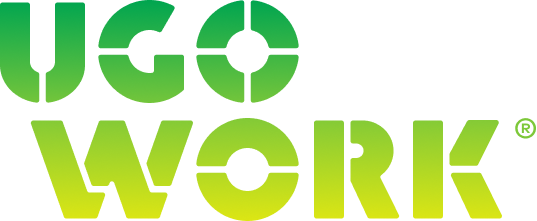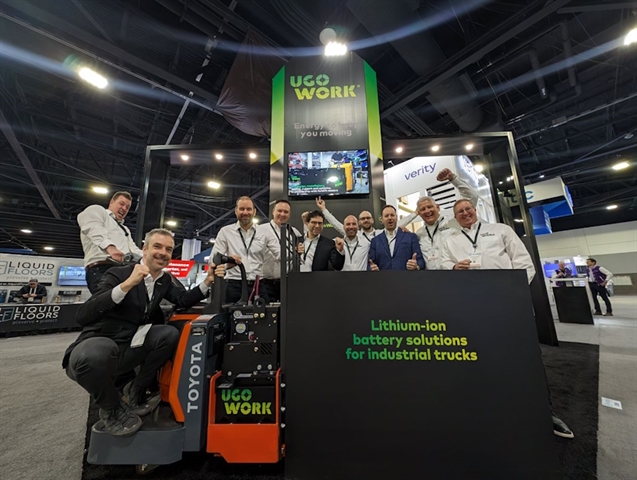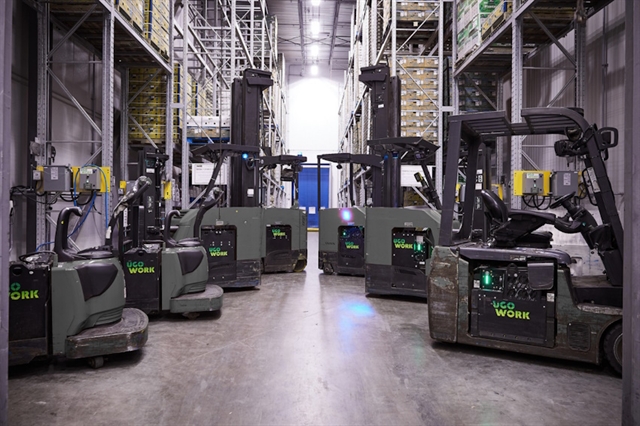
In the material handling industry, 2024 was a year of recalibration, forcing battery manufacturers and material handling teams to adapt or be left behind. The conversation surrounding energy costs, operational performance, and sustainability became louder, fueled by advancements in technology, market disruptions, and changing expectations from businesses across the board.
Throughout the year, UgoWork noticed an uptick in sales of forklift lithium-ion battery technologies to replace equipment powered by legacy lead-acid batteries and internal combustion engines.
Yet, the forklift battery evolution wasn’t without turbulence. Established players are experiencing performance issues or shutting down completely, while newer, often overseas, brands have entered the fray. Pricing wars and fragmentation created uncertainty, but amidst the noise, the industry also moved closer to maturity, driven by a need for reliability and standardization.
This shift wasn’t only about lithium-ion tech per se. Added value has quickly separated battery suppliers from partners who take a more holistic approach to energy. Once seen as disposable commodities, forklift batteries have begun earning recognition for their role in companies’ long-term profitability. Businesses have started looking past the upfront price tag, focusing instead on the total cost of ownership, post-sale customer service, energy expertise to mitigate costs, and circularity to safely recycle and revalorize batteries.
 UgoWork staff members at the MODEX 2024 trade show in Atlanta
UgoWork staff members at the MODEX 2024 trade show in Atlanta
For UgoWork, this backdrop generated many opportunities. The company’s multiple-pronged approach continues to resonate with forward-thinking material handling managers who value the UgoWork offer:
- Next-generation lithium-ion batteries that are UL listed and OEM-certified
- Proprietary battery management system
- Customizable and ultra-compact high-speed charging infrastructure
- Cloud-based 24/7 battery monitoring platform for proactive service and maximized uptime
- Accessible customer success team
- Energy as a Service subscription-based pricing model
Introducing over-the-air (OTA) updates for UgoWork batteries became a highlight of 2024, showcasing how technology could simplify battery updates, providing customers with a hands-off way to keep their forklift equipment at peak performance and benefit from UgoWork’s latest battery innovations.
UgoWork was at the forefront of critical industry conversations. Whether through webinars with major OEMs distributor’s network or seminars at events like MODEX 2024, the company worked to address the pressing need for regulations and quality standards. These discussions underscored the importance of collaboration in building a more unified, predictable future for material handling.
However, perhaps the most striking achievements came as recognition of UgoWork’s distinct contributions to pushing the boundaries of energy solutions in material handling. Securing $51 million in financing was a milestone, showing investor confidence in the company’s long-term growth plan. Meanwhile, being ranked 12th among Canada’s clean tech leaders by Deloitte’s Fast 50 and earning a place on the Deloitte Fast 500 list in North American companies solidified UgoWork’s reputation as a pioneer in the industry and was a vote of confidence in what’s yet to come.
With the arrival of 2025, the material handling industry continues accelerating its adoption of lithium-ion forklift batteries at an impressive pace. Projections point to a leap from today’s 10% market share to an estimated 30% by 2030. But the journey extends well ahead of switching battery technologies. More and more material handling teams are realizing that the vendors they partner with must help them better address operational issues with their forklift fleets.
The intersection of falling lithium prices and rising energy costs will push businesses to rethink how they optimize energy use. Energy will no longer be just a line item on a balance sheet; it will become a strategic asset. This is where new tools, like UgoWork’s UgoPilot™ battery monitoring platform, will play a pivotal role in helping businesses optimize their operations while navigating economic pressure and regulatory compliance, such as the Battery Passport and looming ESG regulations.
 Fleet of pallet-jack riders and reach trucks equipped with UgoWork lithium-ion batteries in a fresh food warehouse
Fleet of pallet-jack riders and reach trucks equipped with UgoWork lithium-ion batteries in a fresh food warehouse
At the same time, the silos that have long defined the industry—separate players for trucks, batteries, chargers, and software—are starting to erode. The future lies in integration and collaboration, as end users demand more cohesive, turnkey solutions. UgoWork is already preparing for this realignment, with plans to expand its product offerings to cover more truck models, applications, and OEM certifications.
Lithium-ion batteries have evolved from an emerging technology to the backbone of material handling workflows, inciting businesses to reconsider how they can leverage equipment to cut costs and speed up throughput. More than integrating new forklift batteries, successful businesses will choose integrated, multifaceted solutions that can positively impact both their top and bottom lines.